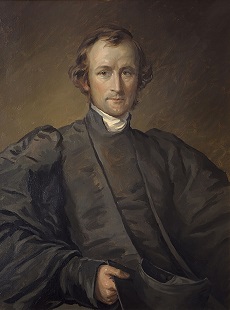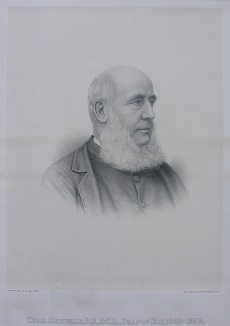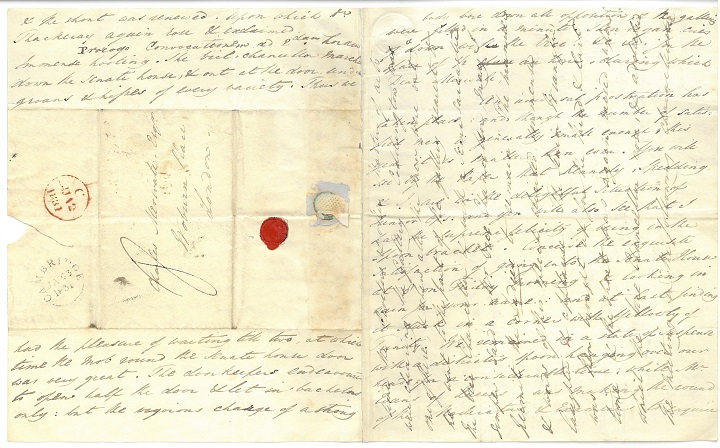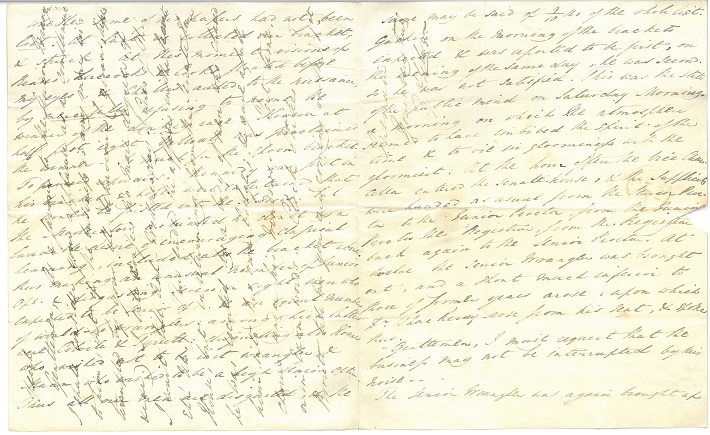A Riotous Commencement: January 1831
In 2019, a letter from George Augustus Selwyn to his friend Charles Merivale was purchased by the Library of St John’s College, Cambridge. In this letter Selwyn, an undergraduate of St John’s, gives Merivale a vivid and entertaining picture of the announcement of the results of the Senate House Examination at the Commencement on Saturday 22 January 1831.[1]
(In the annotation below, JO = junior optime = 3rd class in the mathematical Tripos/Senate House Examination; SO = senior optime = 2nd class; W – wrangler = 1st class.)
 George Augustus Selwyn (21JO, 2nd Classic 1831) was the second of four sons of William Selwyn, 2SO and first Chancellor’s medallist in 1797.[2] The eldest, William, was 6W in 1828, Senior Classic, Craven scholar, Browne medallist and first Chancellor’s medallist; he ended his life as Lady Margaret professor of Divinity. The third brother, who died aged 22, was also Craven scholar and Chancellor’s medallist; while at Eton he had written Eton in 1829–1830: A Diary of Boating and other Events, Written in Greek (London, 1903). The fourth brother, Charles, was MP for the University 1859-68 and in 1868 became a Lord Justice of Appeal. George Augustus himself is remembered as the first Anglican bishop of New Zealand (1841-69; he was then Bishop of Lichfield till his death in 1878), and gave his name to the Cambridge college founded in 1882. Selwyn’s biographer recorded that
George Augustus Selwyn (21JO, 2nd Classic 1831) was the second of four sons of William Selwyn, 2SO and first Chancellor’s medallist in 1797.[2] The eldest, William, was 6W in 1828, Senior Classic, Craven scholar, Browne medallist and first Chancellor’s medallist; he ended his life as Lady Margaret professor of Divinity. The third brother, who died aged 22, was also Craven scholar and Chancellor’s medallist; while at Eton he had written Eton in 1829–1830: A Diary of Boating and other Events, Written in Greek (London, 1903). The fourth brother, Charles, was MP for the University 1859-68 and in 1868 became a Lord Justice of Appeal. George Augustus himself is remembered as the first Anglican bishop of New Zealand (1841-69; he was then Bishop of Lichfield till his death in 1878), and gave his name to the Cambridge college founded in 1882. Selwyn’s biographer recorded that
He was not a reading man at the College, and for mathematics he had an actual distaste … he positively hated the necessary preparation to secure a place, however low, in the Mathematical Tripos which would allow him to go in for the Classical Tripos … he spoke of his degree as his jubilee, and used to score off on a diary hung on his chimneypiece each day which marked which marked the approach of the Examination.[3]
 Selwyn’s correspondent was Charles Merivale (29SO and 4th Classic 1830). A sense of the atmosphere in his college when he was there (1826-33), including the marginalising of Classics by mathematics, can be gained from his autobiography, edited by his niece Judith Merivale in 1899. His father was
Selwyn’s correspondent was Charles Merivale (29SO and 4th Classic 1830). A sense of the atmosphere in his college when he was there (1826-33), including the marginalising of Classics by mathematics, can be gained from his autobiography, edited by his niece Judith Merivale in 1899. His father was
pretty well aware that I was not likely to shine in mathematics, which was the branch of study still held in almost exclusive repute at St John’s; but the college had recently gained some of the highest classical honours in the hands of Kennedy [Benjamin Hall Kennedy, Senior Classic 1837] and Selwyn [William Selwyn, Senior Classic 1828], and it was said on all hands that the old prejudices were breaking up. The classical tripos then newly established would soon break through the walls even of Johnian exclusiveness; new lights even in mathematics were breaking in … [The college] allowed it to be understood that a fellowship would not be given to any below the level of senior optime in mathematics. I remember more than one very good classic who failed of his fellowship from not attaining this point. It was not till George Selwyn came out very little above wooden-spoon that the rule was relaxed.[4]
And so his father sent Merivale to St John’s. He later became a well-known historian (History of the Romans under the Empire, 7 vols, 1850-64), and was Dean of Ely from 1869 till his death in 1893.
…


Dear Merivale,
An unusual prostration has taken place; and though the number of satisfied men is generally small enough, this year it is smaller than ever. You will see by the Paper that Kennedy, Spedding & I are in the delightful situation of Junior Ops:[5] and you will also see that I had the supreme felicity of being in the Spoon bracket. Conceive the exquisite satisfaction of going into the Senate House at 8 on Friday Morning & looking in vain for your name: and at last finding it stuck in a corner with Yellowly of Trinity.[6] We remained in a state of suspense with a districtus[7] spoon hanging over our heads for a considerable time, while Mr. Evans of Queens was making the round of the Moderators & Examiners to enquire whether some of his papers had not been lost.[8] At last we collected our bracket & struck.[9] At this moment visions of Reades, Laccocks & Cooks[10] floated before my eyes & Challis[11] added to the nuisance by mercifully refusing to name the winner of the donkey race. However at half past eight Yellowly was proclaimed the winner. So much for the Spoon bracket. To proceed upwards, Kennedy was first in his bracket & hopes were entertained that he would be foisted into the Seniors, but the Moderators, actuated no doubt by a laudable desire of encouraging Classical learning, included also the bracket above, thus making an unusual number of Junior Ops. & disgusting seven or eight men who expected to be Senior Ops. & an equal number of would-be wranglers: among which latter were Colville & Tyrrell:[12] disgusting also Hoare who wished not to be last wrangler,[13] & Mann who wished to be a high Senior Optim.[14] Thus all the men are disgusted, & the same may be said of 9/10ths of the whole list. Gaskin on the morning of the brackets expected and was reported to be first, on the evening of the same day he was second, so he was not satisfied.[15] This was the state of the public mind on Saturday Morning, a morning on which the atmosphere seemed to have imbibed the spirit of the time & to oil in gloominess with the gloomiest. At the hour of ten the Vice Chancellor entered the Senate House, & the Supplicants were handed as usual from the Senior Proctor to the Junior Proctor, from the Junior Proctor to the Registrar, from the Registrar back again to the Senior Proctor. At twelve the Senior Wrangler was brought out, and a shout much inferior to those of former years arose: upon which Dr. Thackeray[16] rose from his seat, & spoke thus, ‘Gentlemen, I must request that the business may not be interrupted by this noise.’
The Senior Wrangler was again brought up and the shout was renewed. Upon which Dr Thackeray again rose and exclaimed, Prorogo Convocationem ad 2dam horam.[17] Immense hooting. The Vice-Chancellor marched down the Senate House and out at the door. Groans and hisses of every variety. Thus we had the pleasure of waiting till two, at which time the mob round the Senate House was very great. The doorkeepers endeavoured to open half the door & let in bachelors only: but the vigorous charge of a strong body bore down all opposition & the galleries were filled in a minute. Then began cries of ‘down with the Vice!’ &c &c for the space of ½ an hour, during which time the proctors and other Masters of Arts were clearing the Gallery. Coddington[18] was one of these, and when all the men were out, went to the part of the gallery nearest to the Vice Chancellor & with a semi sarcastic simper said Mr. Vice Chancellor, may I permit the Ladies to remain? The manner & words of this speech elicited immense laughter & applause. The Senior Wrangler was then brought up for the third and last time, and the shout was again raised, upon which the Vice Chancellor then rose and addressed the meeting in the following characteristic speech: ‘Gentlemen, As a favour to the Senior Wrangler, I shall consider your applause as a compliment to him; but if the business is any more interrupted by your ill behaviour (groans, hisses, &c &c), I will confer no more degrees, if I wait till Ash Wednesday.’[19] (Cries of Oh, Eh, Uh.) Thus ended the affair in the Senate House, but in returning from the Senate House he was escorted by a body of men, who chased him into his own Lodge, and gave up a chorus under his windows. Port time or in Exon words a Clock strikes.[20] Borrett[21] tells me you are coming the 1st.
I remain, George Augustus Selwyn
[1] George Augustus Selwyn to Charles Merivale, 22 Jan. 1831. St John’s College Special Collections, Miscellaneous/Box 15/SE2b/1. The letter is addressed on the reverse of the second leaf, with red wax seal and two postmarks (one 'Cambridge 23 Jan 1831’, the other ‘24 Jan’), to 'Charles Merivale, Esqr. | Woburn Place | London. My thanks to Kathryn McKee, Special Collections Librarian, St John’s College, for help in decipherment and transcription
[2] The Classical Tripos was at this point a voluntary examination which did not lead to a degree; it was open only to men who had gained honours in mathematics. Successful candidate were known as ‘Classics’, the top scorer being ‘Senior Classics’, the second ‘2nd Classic’ and so on. Men who passed the Senate House Examination as Wranglers or Senior Optimes were eligible to compete for the two Chancellor’s medals in Latin and Greek composition.
[3] H.W. Tucker, Memoir of the Life and Episcopate of George Augustus Selwyn, D.D., Bishop of New Zealand, 1841-1869; Bishop of Lichfield, 1867-1878 (London, 1879),1.9 n.2.
[4] J.A. Merivale (ed.), Autobiography of Charles Merivale, With Selections from his Correspondence (London, 1899), 53, 62. The Wooden Spoon was the last man on the honours list: see C.A. Stray, ‘Rank (dis)order in Cambridge 1753-1909: the Wooden Spoon’, History of Universities XXVI/1 (2012), 163-201.
[5] Junior Optimes:Benjamin Kennedy, James Spedding and Selwyn were 7, 18 and 21JO respectively.
[6] John Yelloly (Trinity). ‘your name’: Selwyn refers to himself. Merivale had been 29JO in 1830.
[7] Suspended, by strings from the galleries. See the reference in n.4 above.
[8] John Evans (Queens’), 22JO.
[9] In other words, they settled the order of candidates within the bracket and stopped there (cf OED s.v. strike, v, 24d).
[10] Frederick Reade (Queens’), Thomas Luckock (St John’s) and Frederick Cook (St John’s), the Wooden Spoons of 1830, 1829 and 1828 respectively.
[11] James Challis (Trinity), moderator; SW 1825, Plumian professor of astronomy 1836-82.
[12] James Colvile (Trinity), 3SO, and William Tyrrell (St John’s), 4SO.
[13] He was: 31W.
[14] He was: 10SO.
[15] Thomas Gaskin (Jesus, 2W), later a moderator in several examinations.
[16] George Thackeray (King’s), Vice Chancellor and Provost of King's.
[17] Thackeray, that is, postponed the meeting till 2pm.
[18] Henry Coddington (Trinity), Senior Wrangler 1820.
[19] The date after which BA degrees awarded were assigned to the following year.
[20] This seems to refer to the clock striking 11pm, when the night watch duties of the Exon, an officer in the Yeoman of the Guard, began. Selwyn was evidently writing on the evening of Commencement Day, and felt it was time to have a glass of port.
[21] William Borrett (Caius), BA 1826.
This Special Collections spotlight was contributed by guest contributor Dr Chris Stray, and supplements his article in the Eagle 2021.